The educational materials listed on this page are about Local and Regional Food Systems.
Local and regional food systems are ones that produce and distribute foods on a local scale rather than a national or international one. Food goes from farmer to table in fewer steps, by means of CSAs (Community-Supported Agriculture), local farmers’ markets, cooperatives, local food hubs or through commercial or institutional buyers, including schools, hospitals, grocery stores and restaurants. The goals of local food systems are improving the economic wellness of communities, increasing avenues to fresh local foods and creating viable markets for farmers and ranchers through value based supply chains and rural/urban integration. Local food systems also help sustainable communities prosper by strengthening the economic resilience of farmers and ranchers, via partnerships and social networks. Local farmers’ cooperatives provide farmers with the resources and scale of production needed to help each other tap lucrative value added food processing opportunities. Community supported agriculture, and farmers co-ops also help beginning farmers have a place to start through the support of the community.
More information on local food systems, including tips for land access, a topic of particular interest to beginning farmers, can be found in the topic brief Building Local and Regional Food Systems. This topic brief is an online collection of practical resources on business and marketing planning, distribution and aggregation, meat processing and food processing, and more. For example, find resources for people who want to build poultry processing facilities or explore small-scale meat packing. The guide Building a Sustainable Business can be of service to beginning farmers, with its approaches to starting a successful farming business in a local food system and writing business plans and marketing plans.
Showing 1-15 of 15 results
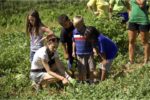
Vermont Food Education Every Day
Includes guides for farmers and food service personnel working to increase local food in schools.
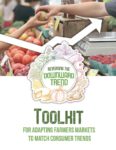
Reversing the Downward Trend
Farmers across the Northeast have reported decreases in consumer participation at farmers' markets and reduced sales. This toolkit was developed as a result of survey research that looked at consumer perceptions of shopping at farmers' markets. The publication provides information on marketing strategies and services aimed to help farmers' market managers and farmers understand what […]

Evaluation of the Intervale Center Food Hub
From 2007 to 2010, the Intervale Food Hub grew from a research project to a food hub with 21 participating farms, grossing $280,000 in total and returning 70 percent to participating farmers. The food hub provides the infrastructure needed to aggregate produce from local farms and distribute it to the community. With the help of a 2007 […]
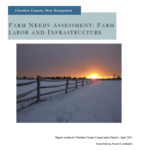
Cheshire Labor and Infrastructure Needs Assessment
In 2011, New Hampshire's Cheshire County Conservation District explored the labor and infrastructure needs for farms in the county to provide farmers, agricultural service providers and community members with the information they need to promote economic viability of agriculture. The needs assessment reports on labor-related barriers faced by farmers in Cheshire County as well as […]
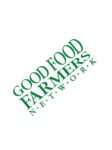
Good Food Farmers Network Guide
The guide, written by farmer Henry Corsun of Dog Wood Farm in Old Chatham NY, documents the work to develop Good Food Farmers Network as a replicable model of farmer-owned joint marketing and sales. The model was designed to require little start-up capital and utilizes nationally available resources to make it more readily available to […]
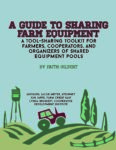
A Guide to Sharing Farm Equipment
Hudson Valley New York farmer Faith Gilbert of Letterbox Farm Collective wrote this guide for farmers, service providers, cooperators, and organizers of shared equipment pools. The guide covers an array of practical concerns for equipment sharing. Contents include case studies, a review of different ownership and management arrangements, financial considerations, annotated budgets, sample fee structures, […]
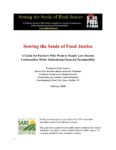
Sowing the Seeds of Justice Food Manual
This manual offers strategies and insights to help farmers run a small farm business that supports the needs of low-income communities. It is drawn from the lived experiences of farmers at Soul Fire Farm, a family farm working to end racial and economic injustice in the food system, and partner farms as well as research […]
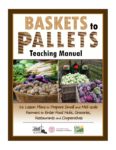
Baskets to Pallets Teaching Manual
The Baskets to Pallets Teaching Manual was written by Violet Stone, New York state SARE coordinator, as part of a state-based professional development program aimed at addressing the gap of tools to support farmers as they decide if, when and how to sell to a wholesale market. The Manual contains lessons plans and teaching resources that educators […]

Guild by association: Partnership grant organizes Maryland cheesemakers
Although consumer demand for local Maryland artisanal and farmstead cheeses is high, state regulatory hurdles have created significant barriers for this emerging industry. Working with Ginger Myers, agricultural marketing specialist with the University of Maryland Extension, a committed group of farmstead cheese producers and agriculture support specialists teamed up to form the Maryland Cheesemakers' Guild […]
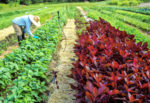
Food hub faces the challenges of scaling up ethnic produce
The New Entry Sustainable Farming Project (NESFP), led by Jennifer Hashley, has a 20-year history of training next generation farmers—including immigrant and refugee growers—to improve local food systems. A recent Northeast SARE Partnership grant supported the Project’s food hub initiative aimed at long-term economic self-reliance among farmers while expanding access of healthy, culturally-appropriate foods in […]

Understanding Food Safety
This document lays out permitting requirements and safe food handling practices at farmers markets.
Assessing the Economic Impacts of Regional Food Hubs: the Case of Regional Access
This report assesses the economic impact of food hubs on the distribution and sale of local foods.
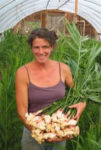
Ginger: An ancient crop in the New World
Melissa Bahret of Old Friends Farm in Amherst, Massachusetts, saw that her greenhousewas sitting idle in the late spring and summer, after her vegetable starts were in the ground or sold to customers. She and her business partner, Casey Steinberg, were looking for new ways to use the space and to complement the flowers, salad […]

Fair Trade Strategy for Northeast "Eco-Growers"
For Northeast apple farmers it was a matter of survival. Facing a perfect storm of rising land, oil and labor prices, along with fierce competition from China and Chile, the apple farmers needed to find new revenue streams fast. They began a collaboration with Red Tomato, a Massachusetts-based nonprofit organization that helps connect consumers to […]
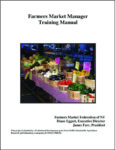
Farmers Market Managers Training Manual
This comprehensive training resource provides tools for market managers to be effective and to overcome common obstacles they face.